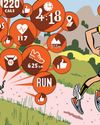Strong-willed. Positive. Unapologetic About Who She Is. We Catch Up With The Heroine Of South African Running.

FROM 1 NOVEMBER, female track athletes with elevated levels of testosterone participating in the events Olympic gold medallist Caster Semenya typically features in will be required to take medication to reduce their levels of the hormone. Under the new IAAF rules, athletes who refuse will be shut out of competing in a thin band of events at international meetings, ranging from the 400 metres to the mile (1 600m).
As Semenya prepares for the 2020 Olympics, new rules for hyperandrogenic athletes are pushing her out of the sport.
But, Semenya says, tough battles – like the one she is about to face – make her stronger.
RUNNER’S WORLD: How are your preparations going for the 2020 Olympics?
Caster Semenya: So far, so good. I’m feeling optimistic. My approach is always to take it step by step, and I like to focus on short-term goals.
Each month, I try to improve my fitness, biomechanics and breathing. I train twice a day; two hours in the morning and another two hours in the evening, with a rest in between those sessions.
During each session, my coach Samuel Sepeng and I focus on form, pace and power. He pushes me hard, which is one of the reasons I believe he’s one of the best in the business.
I’m a simple person, so I always tend to go for the basics when it comes to nutrition – eggs are on top of my list.
I’ll be 29 when I compete in the 800m at my third Olympics, so they could possibly be my last. But you never know where you’re going to end up – I could still run even faster after that!
What sacrifices have you made to excel in your sport?
This story is from the November 2018 edition of Runner's World SA.
Start your 7-day Magzter GOLD free trial to access thousands of curated premium stories, and 9,000+ magazines and newspapers.
Already a subscriber ? Sign In
This story is from the November 2018 edition of Runner's World SA.
Start your 7-day Magzter GOLD free trial to access thousands of curated premium stories, and 9,000+ magazines and newspapers.
Already a subscriber? Sign In

LONGOVERDUE PRAISE FOR THE RUNNING SINGLET
In the last decade, the running singlet once reserved for amateur competitors and professional athletes - has gone mainstream, not only on race day but also on everyday runs.

RISE OF THE 'ILLEGAL RUNNING SHOES
Banned shoes emerged at a basketball court long before they found their way onto a marathon course.

CRACKING THE SLEEP CODE
Are you an early bird or a night owl? Perhaps you've assigned yourself another animal after completing an internet quiz. Research is shedding light on the link between well-being and circadian predisposition, but there's no need to rewire yourself. Learn to lean into your biology with our guide.

THE SECRET TO SPEED IS IN YOUP BLOOD
Some of the world's best runners credit this unorthodox Norwegian training method for their success. Is it right for you?

THE MIND OF MASSYN
IN 2024, LOUIS MASSYN WILL ATTEMPT HIS 49TH COMRADES MARATHON AND HE'S LEARNT PLENTY OF LESSONS ALONG THE WAY. HERE'S THE STORY OF HIS AMAZING JOURNEY.

TAKING CHARGE
OUTSPOKEN AND AMBITIOUS, NEW COMRADES RACE MANAGER (AND FORMER WINNER) ANN ASHWORTH IS LOOKING TO TAKE THE RACE INTO THE FUTURE.

A HALF CENTURY OF COMRADES
THIS YEAR, BARRY HOLLAND WILL BE AIMING TO FINISH HIS 50TH CONSECUTIVE COMRADES MARATHON. THIS IS WHAT HAS INSPIRED HIM.

MY RUNNING LIFE
ORDINARY RUNNERS doing EXTRAORDINARY THINGS

Ageing In The Age Of Strava
RECENTLY MY BUDDY Sean sent a text message that said, “Been running a lot of 5:30–6:00 kays early. It feels pretty nice at that pace.”

How To Start A Run When You Don't Feel Like It
I'VE ALWAYS FELT validation when reading a story about writers and their love of procrastination.